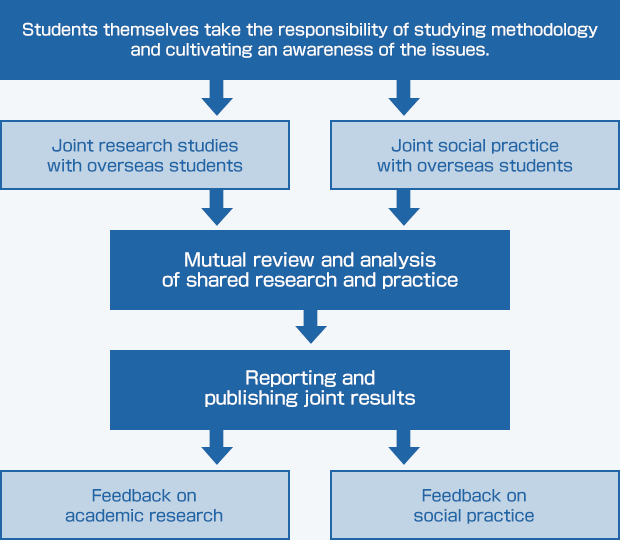Graduate School of Global Humanities and Social Sciences
Distinctive Education
Seminars in Global Humanities and Social Sciences
The course group of “Academic Elements” is structured as an open program that provides a flexible framework for learning, and its practical summaries are provided through the required Seminars in Global Humanities and Social Sciences.
Seminars in Global Humanities and Social Sciences builds on the expertise, techniques, and cross-disciplinary frameworks learned in the “Academic Elements” to provide practical solutions to problems in multicultural societies through cross-disciplinary case studies, discussions, lectures, and networking parties.
Example Case Method (Discussion Style)
“Toward a solution to the multicultural social situation and its problems related to religion”
Students and faculty hold cross-disciplinary discussions on religious antagonism/conflict, fundamentalism and terrorism.
– Migration: contact with different values through the movement of people
– Poverty: Economic disparity advancing on a global scale
– The loss of connections and the isolation of minorities
– Fluctuations in identity
– Exclusivism as rejection
↓
Toward extreme expressions of religion
Clarify the universal and urgent issue of how society can remain viable while avoiding the unique risks of the modern world.
– The religious problems that are manifesting themselves mainly in the Middle East and Europe “can happen anywhere.”
– Can also be applied to natural disaster risks (e.g., 2011 Tohoku Earthquake).
Integrating and developing the “Academic Practices” based on the results of the “Academic Elements” towards a summary of the research.
– By re-embedding ontology and epistemology, which cut across each specialized field, and constructing a new, cross-disciplinary comprehensive framework, faculty and students who participated in the case method propose their own solutions through groupwork and other means.
– Integration of quantitative and qualitative analysis by specific indicators (religious, ethnic, economic, political, educational…)
– Clarification of the viewpoint that comprehensively captures the “part” and “whole” of the subject (as a place where local historical factors and global factors intersect)
– Discussion of policy issues, their cost-effectiveness, and appropriate policy approaches through policy study and policy analysis
– Comprehensive research guidance system that allows students to receive cross-disciplinary guidance, and setting clear, PDCA-based milestones
– Thorough quality assurance of research for all students writing master’s thesis
Overseas Experience Electives
Through contact and interaction with cultural and linguistic others, students acquire excellent language skills, the ability to gather and analyze information, a deep awareness of diversity and the environment, and a deep empathy for other cultures and people.
Specific content: active learning through overseas fieldwork
Then
Study consisted of faculty-led unilateral endeavors that treated foreign societies and cultures as mere subjects of research.

Now
Students raise their own issues and adopt a project-based approach with an emphasis on bilateral communication with overseas students.



